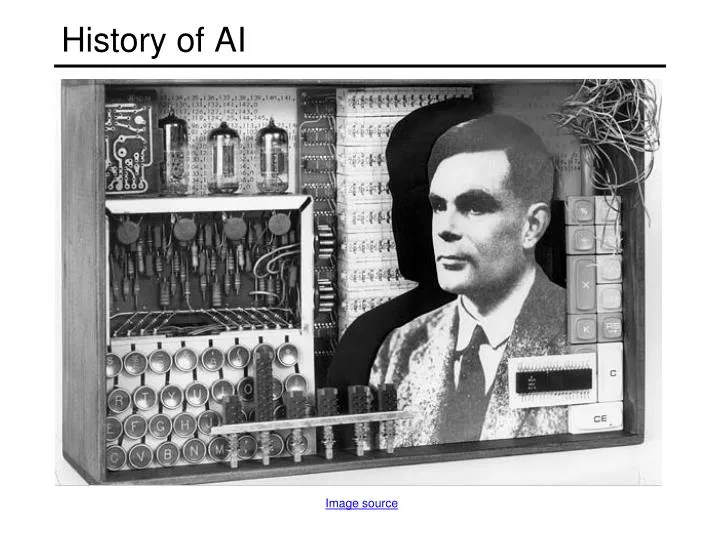

History of AI
Aug 10, 2014
130 likes | 356 Views
History of AI. Image source. Origins of AI. 1940s First model of a neuron (McCulloch & Pitts) Hebb ian learning rule Cybernetics 1950s Turing Test Perceptrons (Rosenblatt) “ Look, Ma, no hands!” period : Computer chess and checkers (Shannon, Samuel)
Share Presentation
- comparatively easy
- ny times timeline
- ibm experiment
- scientific engineering methodology
- dichotomies
- ai researchers

Presentation Transcript
History of AI Image source
Origins of AI • 1940sFirst model of a neuron (McCulloch & Pitts) • Hebbianlearning rule • Cybernetics • 1950sTuring Test • Perceptrons(Rosenblatt) • “Look, Ma, no hands!” period: • Computer chess and checkers (Shannon, Samuel) • Machine translation (Georgetown-IBM experiment) • Theorem provers (Newell and Simon, Gelernter and Rochester) • 1956Dartmouth meeting: “Artificial Intelligence” adopted
Herbert Simon, 1957 • “It is not my aim to surprise or shock you –but … there are now in the world machines that think, that learn and that create. Moreover, their ability to do these things is going to increase rapidly until –in a visible future – the range of problems they can handle will be coextensive with the range to which human mind has been applied. More precisely: within 10 years a computer would be chess champion, and an important new mathematical theorem would be proved by a computer.” • Simon’s prediction came true –but forty years later instead of ten
Harder than originally thought • 1966: Elizachatbot (Weizenbaum) • “ … mother …” → “Tell me more about your family” • “I wanted to adopt a puppy, but it’s too young to be separated from its mother.” • 1954: Georgetown-IBM experiment • Completely automatic translation of more than sixty Russian sentences into English • Only six grammar rules, 250 vocabulary words, restricted to organic chemistry • Promised that machine translation would be solved in three to five years (press release) • Automatic Language Processing Advisory Committee (ALPAC) report (1966): machine translation has failed • “The spirit is willing but the flesh is weak.” →“The vodka is strong but the meat is rotten.”
Blocks world (1960s – 1970s) ??? Larry Roberts, MIT, 1963
“Moravec’s Paradox” • Hans Moravec (1988): “It is comparatively easy to make computers exhibit adult level performance on intelligence tests or playing checkers, and difficult or impossible to give them the skills of a one-year-old when it comes to perception and mobility.” • Why is this? • Early AI researchers concentrated on the tasks that they themselves found the most challenging, abilities of animals and two-year-olds were overlooked • We are least conscious of what our brain does best • Sensorimotor skills took millions of years to evolve • Our brains were not designed for abstract thinking
History of AI, cont. • 1940s First model of a neuron (McCulloch & Pitts) • Hebbianlearning rule • Cybernetics • 1950s Turing Test • Perceptrons(Rosenblatt) • “Look, Ma, no hands!” period: • Computer chess and checkers (Shannon, Samuel) • Machine translation (Georgetown-IBM experiment) • Theorem provers (Newell and Simon, Gelernter and Rochester) • Late 1960s Machine translation deemed a failure • Neural networks deprecated (Minsky and Papert, 1969) • Early 1970s Intractability is recognized as a fundamental problem • Late 1970sThe first “AI Winter”
History of AI, cont. • 1980s Expert systems boom • Late 1980s- Expert system bust; the second “AI winter” • Early 1990s • Mid-1980sNeural networks return to popularity • Late 1980sProbabilistic reasoning on the ascent • 1990s-PresentMachine learning everywhere • Big Data History of AI on Wikipedia AAAI Timeline Building Smarter Machines: NY Times Timeline
What accounts for recent successes in AI? • Faster computers • The IBM 704 vacuum tube machine that played chess in 1958 could do about 50,000 calculations per second • Deep Blue could do 50 billion calculations per second– a million times faster! • Lots of storage, lots of data • Dominance of statistical approaches, machine learning
Some patterns from history • Boom and bust cycles • Periods of (unjustified) optimism followed by periods of disillusionment and reduced funding • Dichotomies (Newell, 1983): • Continuous vs. symbolic • Problem solving vs. recognition • High-level vs. low-level modeling of mental processes • Performance vs. learning • Serial vs. parallel • … • “Neats” vs. “scruffies” (textbook) • Today: triumph of the “neats” or triumph of the “scruffies”?
AI gets no respect? • AI effect: As soon as a machine gets good at performing some task, the task is no longer considered to require much intelligence • Calculatingability • Chess • Learning: “The Analytical Engine has no pretensions to originate anything. It can do whatever we know how to order it to perform”(Ada Lovelace, 1842) • Similar picture with animal intelligence • Tools, mirror test, …
Take-away message for this class • Our goal is to use machines to solve hard problems that traditionally would have been thought to require human intelligence • We will try to follow a sound scientific/engineering methodology • Consider relatively limited application domains • Use well-defined input/output specifications • Define operational criteria amenable to objective validation • Use abstraction to zero in on essential problem features • Focus on general-purpose tools with well understood properties
- More by User
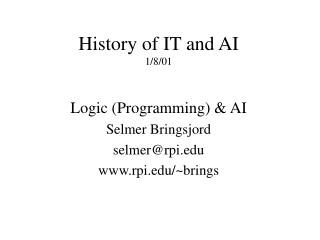
History of IT and AI 1/8/01
History of IT and AI 1/8/01. Logic (Programming) & AI Selmer Bringsjord [email protected] www.rpi.edu/~brings. What is a Proof?. Aristotle Syllogisms Frenchmen example… Fatal problems (including can’t handle Euclid!)
360 views • 9 slides
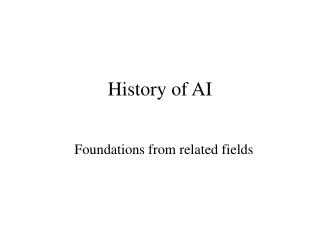
History of AI. Foundations from related fields. Philosophy (400 B.C-). Socrates->Plato->Aristotle
531 views • 22 slides
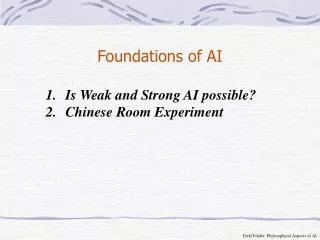
Foundations of AI
Foundations of AI. Is Weak and Strong AI possible? Chinese Room Experiment. Introduction. Philosophers have formed two hypothesis: Weak hypothesis. Can machines act intelligently? b. Strong hypothesis. Do machines actually think? Or do they simulate thinking?.
339 views • 9 slides
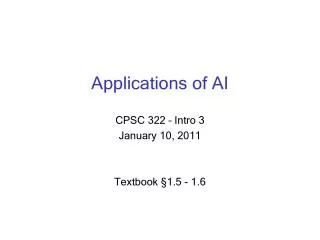
Applications of AI
Applications of AI. CPSC 322 – Intro 3 January 10, 2011 Textbook § 1.5 - 1.6. Today’s Lecture. Recap from last lecture Further Representational Dimensions Applications of AI. Representation and Reasoning (R&R) System. Problem ⟹ representation ⟹ computation
549 views • 42 slides

History of AI. Image source. What are some successes of AI today?. IBM Watson. http://www-03.ibm.com/innovation/us/watson/ NY Times article Trivia demo IBM Watson wins on Jeopardy (February 2011). S elf-driving cars. Google’s self-driving car passes 300,000 miles (Forbes, 8/15/2012)
380 views • 22 slides

AI of Sports Games
Dylan Evans Matt Kenig. AI of Sports Games. Overview. Dead reckoning Designing a sports game AI In Baseball games, the main features of the AI involve: Behaviors The Ball Hit Event The Ball Fielded Event. Dead Reckoning.
1.37k views • 48 slides

History of AI. Image source. Origins of AI. 1940s McCulloch & Pitts neurons; Hebb’s learning rule Turing’s “Computing Machinery and Intelligence ” Shannon’s computer chess 1954 Georgetown-IBM machine translation experiment
400 views • 12 slides

History of. Survey Project by Melissa Lewis. Thesis .
392 views • 12 slides

Foundations of AI. 8. Satisfiability and Model Construction. Davis-Putnam, Phase Transitions, GSAT Wolfram Burgard and Bernhard Nebel. Contents. Motivation Davis-Putnam Procedure “Average” complexity of the satisfiability problem GSAT: Greedy SAT Procedure. Motivation. Usually:
351 views • 21 slides
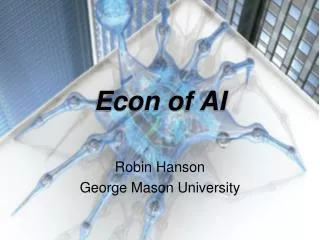
Econ of AI. Robin Hanson George Mason University. Outline. World long-term econ trend mostly steady Now doubles in ~15 years So far have seen 2-4 “singularities” when World econ growth rate increased x150-250 In much less than a previous doubling time
624 views • 41 slides
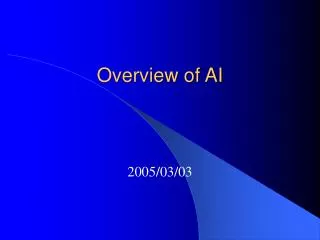
Overview of AI
Overview of AI. 2005/03/03. Outline. Introduction A brief history AI methods Problem solving Knowledge representation and reasoning Learning Research areas Related resources. Introduction. Motivation
213 views • 12 slides
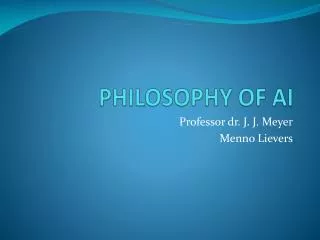
PHILOSOPHY OF AI
PHILOSOPHY OF AI. Professor dr. J. J. Meyer Menno Lievers. WHAT IS THINKING?. Conceptual problem? Empirical problem? What is the task of philosophy? Is philosophy a science?. Conceptual problem?. Solution: conceptual analysis (Bennett & Hacker). Empirical problem?.
818 views • 43 slides

Ch1 AI: History and Applications
Ch1 AI: History and Applications. Dr. Bernard Chen Ph.D. University of Central Arkansas Spring 2011. Outline. AI History Overview of AI application areas. History. There are two consequences of mind/body analysis essential to the AI enterprise:
299 views • 17 slides

History of AI. Image source. Early excitement. 1940s McCulloch & Pitts neurons; Hebb’s learning rule Turing’s “Computing Machinery and Intelligence” 1954 Georgetown-IBM machine translation experiment 1956 Dartmouth meeting: “Artificial Intelligence” adopted
215 views • 13 slides
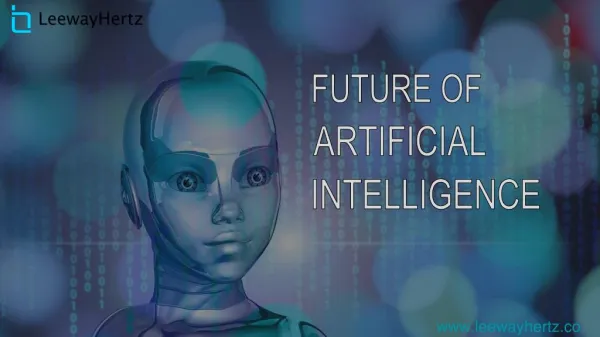

Future of AI
The ppt describes the future of AI
17.28k views • 14 slides

242 views • 22 slides
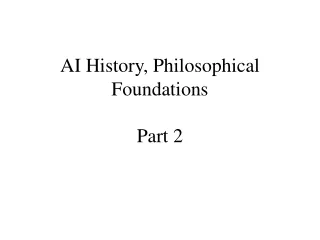
AI History, Philosophical Foundations Part 2
AI History, Philosophical Foundations Part 2. Some highlights from early history of AI. G ö del’s theorem: 1930 Turing machines: 1936 McCulloch and Pitts neurons: 1943 (introduced field of "neural networks”) Von Neumann self-reproducing automaton: 1940s.
212 views • 16 slides
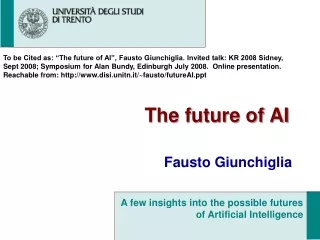
The future of AI
To be Cited as: “The future of AI”, Fausto Giunchiglia. Invited talk: KR 2008 Sidney, Sept 2008; Symposium for Alan Bundy, Edinburgh July 2008. Online presentation. Reachable from: http://www.disi.unitn.it/~fausto/futureAI.ppt. The future of AI. Fausto Giunchiglia.
511 views • 24 slides
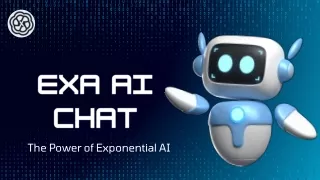
EXA AI Chat: The Potential of Exponential AI
Explore the potential of Exponential AI with EXA AI Chat. Delve into the transformative power of this advanced technology, unlocking new possibilities for personalized interactions and seamless communication. Join us as we uncover the limitless potential of EXA AI Chat in shaping the future of customer engagement.
16 views • 9 slides

The Future of AI: Exploring Nude AI Generators
The future of AI in the realm of nude generation is a topic of significant debate, with ethical considerations playing a crucial role in the discussion. AI nude generators are a type of technology that uses deep learning algorithms and neural networks to create highly convincing synthetic nude images, often for artistic expression or other purposes. https://bare.club/generate
24 views • 7 slides

- My presentations
Auth with social network:
Download presentation
We think you have liked this presentation. If you wish to download it, please recommend it to your friends in any social system. Share buttons are a little bit lower. Thank you!
Presentation is loading. Please wait.
History of Artificial Intelligence(AI)
Published by Jean-François Jolicoeur Modified over 6 years ago
Similar presentations
Presentation on theme: "History of Artificial Intelligence(AI)"— Presentation transcript:

ARTIFICIAL INTELLIGENCE

Additional Topics ARTIFICIAL INTELLIGENCE

Artificial Intelligence

Artificial Intelligence An Introductory Course. Outline 1.Introduction 2.Problems and Search 3.Knowledge Representation 4.Advanced Topics.

An Introduction to Artificial Intelligence Presented by : M. Eftekhari.

Introduction to AI Kaziwa H. Saleh. What is AI? John McCarthy defines AI as “the science and engineering to make intelligent machines”. AI is the study.

AI 授課教師:顏士淨 2013/09/12 1. Part I & Part II 2 Part I Artificial Intelligence 1 Introduction 2 Intelligent Agents Part II Problem Solving 3 Solving Problems.

A Brief History of Artificial Intelligence

WHAT IS ARTIFICIAL INTELLIGENCE?

Artificial Intelligence A Modern Approach Dennis Kibler.

Artificial Intelligence Austin Luczak, Katie Regin, John Trawinski.

CSE 471/598,CBS598 Introduction to Artificial Intelligence Spring 2005

Introduction to Introduction to Artificial Intelligence Henry Kautz.

1 Lecture 33 Introduction to Artificial Intelligence (AI) Overview Lecture Objectives. Introduction to AI. The Turing Test for Intelligence. Main.

Introduction to Artificial Intelligence CSE 473 Winter 1999.

Artificial Intelligence Overview John Paxton Montana State University August 14, 2003.

CSE 471/598,CBS598 Introduction to Artificial Intelligence Fall 2004

Random Administrivia In CMC 306 on Monday for LISP lab.

Artificial Intelligence Instructor: Professor Yun Peng

CSE 471/598 CBS 598 Introduction to Artificial Intelligence Spring 2008
About project
© 2024 SlidePlayer.com Inc. All rights reserved.
- Preferences

History of Artificial Intelligence - PowerPoint PPT Presentation
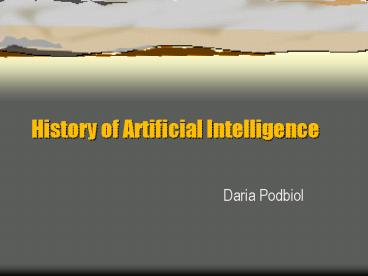
History of Artificial Intelligence
Revolutionized every aspect of the storage and processing of information. ... late 80's - downfall of ai industry. ai being incorporated in war (early 1990's) ... – powerpoint ppt presentation.
- Daria Podbiol
- 1941 First Electronic computer
- revolutionized every aspect of the storage and processing of information.
- 1949 First comercial stored program
- invention of an electronic means of processing data
- John McCarthy regarded as the father of AI the Dartmouth conference in 1956 first use of term Artificial Intelligence
- Norbert Wiener - feedback theory
- example of that theory is the thermostat
- Newell and Simon - The Logic Theorist, (considered to be the first AI program)
- In 1958 McCarthy announced new development - the LISP language (LISt Processing)
- SHRDLU - part of the microworlds project
- the late 1960's 2 programs
- STUDENT - algebra problems
- SIR - understand simple English sentences
- expert systems - Edward Feigenbaum
- language analysis - Roger Schank
- knowledge representation for mental constructs - Marvin Minsky
- automatic learning and the nature of heuristics -Douglas Lenat
- computer vision - David Marr
- PROLOG language - convenient higher language for AI researhes.
- XCON - the first expert system in industrial world
- AI boom - the number of AI groups increased
- Milions spent on developing the AI
- These seemingly intelligent programs simply make dumb decisions faster Mavin Minsky
- late 80's - downfall of AI industry
- Operation Desert Storm
- Two projects successing the Automated Land Vehicle project
- Pilot's Associate project (electronic copilot)
- Battle Management System project (military expert systems).
- In 1996 - the victory of Deep Blue over chess champion Kasparov
- Genetic Engineering
- Bioinformatics
- Cars(ABS and cruise control)
- Air Conditioners
- Video Games
- Movies (Lord of the rings)
- Digital cameras
- On the stock exchange
- Googles search engine
- http//www.generation5.org/content/1999/aihistory. asp
- http//abstractdimension.com/index.php/category/te chnology/
- http//library.thinkquest.org/2705/history.html
PowerShow.com is a leading presentation sharing website. It has millions of presentations already uploaded and available with 1,000s more being uploaded by its users every day. Whatever your area of interest, here you’ll be able to find and view presentations you’ll love and possibly download. And, best of all, it is completely free and easy to use.
You might even have a presentation you’d like to share with others. If so, just upload it to PowerShow.com. We’ll convert it to an HTML5 slideshow that includes all the media types you’ve already added: audio, video, music, pictures, animations and transition effects. Then you can share it with your target audience as well as PowerShow.com’s millions of monthly visitors. And, again, it’s all free.
About the Developers
PowerShow.com is brought to you by CrystalGraphics , the award-winning developer and market-leading publisher of rich-media enhancement products for presentations. Our product offerings include millions of PowerPoint templates, diagrams, animated 3D characters and more.


IMAGES
VIDEO
COMMENTS
A History of AI Public Perception ... The Mecha David in "A. I. Artificial Intelligence" (Spielberg, 2001) Perception of AI Terminators after the rise of Skynet "Terminator III" (Mostow, 2003) Cybernetics Norbert Wiener, 1894-1964 1947 1950.
History of Artificial Intelligence. The contributions of other fields to the development of AI is seen by many as so important that they consider the history of AI can't be recounted without including the discussion of history of knowledge that dates back to Aristotle. ... An Image/Link below is provided (as is) to download presentation ...
Artificial intelligence (AI) has captured the imagination of everyone around the world for decades. From the early conceptualization of intelligent robots to the recent advancements in machine learning, the history of AI is a testament to human ingenuity and perseverance. In this blog post, letu2019s look into the intriguing journey of AI, exploring its origins, milestones, and future prospects.
artificial intelligence (AI) focusing on present applications and future science and technology (S&T) opportunities in the Cyber Security and Information Sciences Division (Division 5). This report elaborates on the main results from the study. Since the AI field is evolving so rapidly, the study scope was to look at the recent past and
5 Strong AI and Weak AI There are two entirely different schools of Artificial Intelligence: Strong AI: This is the view that a sufficiently programmed computer would actually be intelligent and would think in the same way that a human does. Weak AI: This is the use of methods modeled on intelligent behavior to make computers more efficient at solving problems.
History of AI. Image source. Origins of AI. 1940s First model of a neuron (McCulloch & Pitts) Hebb ian learning rule Cybernetics 1950s Turing Test Perceptrons (Rosenblatt) " Look, Ma, no hands!" period : Computer chess and checkers (Shannon, Samuel) Slideshow 3133121 by dima
Prehistory of AI 4th cent. B.C 14th-16th cent 18th cent Aristotle studied mind & thought, defined formal logic(the study of arguments. ). 14th-16th cent New thought built on the idea that all natural or artificial processes could be mathematically analyzed and understood. 18th cent distinction between mind & brain.
Artificial intelligence (AI) has captured the imagination of everyone around the world for decades. From the early conceptualization of intelligent robots to the recent advancements in machine learning, the history of AI is a testament to human ingenuity and perseverance. In this blog post, let's look into the intriguing journey of AI, exploring its origins, milestones, and future prospects ...
Abridged history of AI • 1943 McCulloch & Pitts: Boolean circuit model of brain • 1950 Turing's "Computing Machinery and Intelligence" • 1956 Dartmouth meeting: "Artificial Intelligence" adopted ... "Artificial Intelligence" adopted • 1952—69 Look, Ma, no hands! • 1950s Early AI programs, including Samuel's checkers
The History of Artificial Intelligence - Artificial intelligence (AI) has captured the imagination of everyone around the world for decades. From the early conceptualization of intelligent robots to the recent advancements in machine learning, the history of AI is a testament to human ingenuity and perseverance.